Many people around you wear dentures, and most of the time you would never know. They are artificial teeth that can be easily removed and replaced by the wearer. They are the most cost effective way to replace your missing teeth.
Dentures can take 2-6 months to get used to. You are probably used to limited chewing surface or no teeth at all, and having new dentures your mouth will feel abnormally full. You will sound funny when you talk, eating and drinking will be foreign. Eventually you will get used to them. The fit of them may change over the years and you may need to have them relined (adjustment of the surface that contours to create a better fit). Keep in mind as well if you opted for the immediate dentures (teeth out and denture in same day), for the first month your dentures are more of a bandaid, and an aesthetic accessory than a functional denture. Once healing has occurred make sure you come in for your soft relines.
Here are some things that will help you get used to wearing your dentures:
You may bite your cheek and tongue for the first while with new dentures. Chewing tough or fibrous foods such as steak or lettuce, may be difficult to chew. Chewing slowly and avoiding tough foods is a good idea. Steaming your vegetables will help also.
Your Dentures are more fragile than your natural teeth. Opening bottles, cracking nuts, etc. will damage your dentures.
Reading out loud to yourself or videotaping yourself speaking, will help you figure out how your dentures work into your scheme of speech. You can ask someone to listen to you to help you hear the differences that subtle changes in your functioning make. But keep in mind you will most likely notice the change in your speech more than anyone else.
Some recent research points to a link between sleeping without your dentures and sleep apnea. This is because the airway collapses without the dentures to hold it in it’s natural position. If you find sleeping without your dentures causes you to have restless and/or uncomfortable sleep or you are tired all the time, fall asleep anywhere even sometimes while driving. You may struggle with sleep apnea and it would be a good idea to sleep with you dentures in, but make sure you find some other time during the day to give your tissues a break for at least 3-4 hours a day.
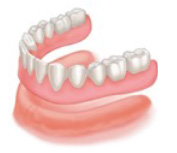
Complete lower denture
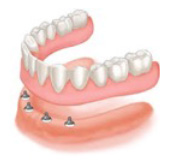
Complete lower implant supported denture
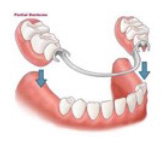
Partial lower denture
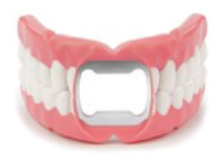
Your Dentures are more fragile than your natural teeth. Opening bottles, cracking nuts, etc. will damage your dentures.
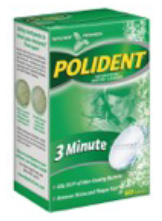
Denture cleaners help kill bacteria that live in the acrylic
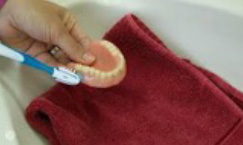
Filling the sink with a towel or water prevents damage if dropped.